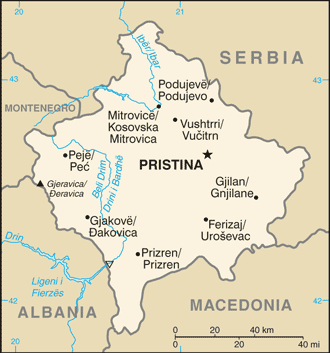The Republic of Kosovo /ˈkɒsəvə, -oʊ/ (Albanian: Republika e Kosovës; Serbian: Република Косово, Republika Kosovo) is a majority recognised state in the Balkans region of Southeastern Europe. Its largest city and capital is Pristina. Kosovo is landlocked and is bordered by the Republic of Macedonia to the south, Albania to the west and Montenegro to the northwest. The nature of the remaining line of demarcation is the subject of controversy — seen by proponents of Kosovan independence as the Kosovo-Serbia border and seen by opponents of the independence as the boundary between Central Serbia and an autonomous Kosovo within Serbia.[5] Kosovo institutions have control over most of the territory of Kosovo, while North Kosovo, the largest Serb-majority enclave, is largely outside their control and is run by local Serbian institutions with funds and support from Belgrade.
Following an insurgency by Albanians from 1997-1999, after a failure to produce results from non-violent resistance to Serbian rule from 1990,[6] NATO launched a 78-day assault on FR Yugoslavia to halt the war in Kosovo. In 1999 the United Nations through UNMIK began overseeing the administration of the province after a UN Security Council (UNSC) resolution. On 17 February 2008 Kosovo's Parliament declared independence, as the "Republic of Kosovo", which has received recognition from some nation states. Serbia does not recognise the unilateral secession of Kosovo[7] and considers it a UN-governed province within its sovereign territory,[8] a position supported by a number of other countries.
The Republic of Kosovo has been recognised by 106 UN member states and is a member of the International Monetary Fund (IMF), World Bank, International Road and Transport Union (IRU), Regional Cooperation Council and the European Bank for Reconstruction and Development.[9]
Disintegration of Yugoslavia
Main articles: Kosovo War, Autonomous Province of Kosovo and Metohija, andRepublic of Kosova (1990–2000)
Further information: Disintegration of Yugoslavia
Inter-ethnic tensions continued to worsen in Kosovo throughout the 1980s. The 1986Memorandum of the Serbian Academy warned that Yugoslavia was suffering from ethnic strife and the disintegration of the Yugoslav economy into separate economic sectors and territories, which was transforming the federal state into a loose confederation.[10]
On 28 June 1989, Slobodan Milošević delivered the Gazimestan speech in front of a large number of ethnic Serbs at the main celebration marking the 600th anniversary of theBattle of Kosovo at the Gazimestan. Many think that this speech helped Milošević consolidate his authority in Serbia.[11] In 1989, Milošević, employing a mix of intimidation and political manoeuvring, drastically reduced Kosovo's special autonomous status within Serbia and started cultural oppression of the ethnic Albanian population.[12] Kosovo Albanians responded with a non-violent separatist movement, employing widespread civil disobedience and creation of parallel structures in education, medical care, and taxation, with the ultimate goal of achieving the independence of Kosovo.[13]
On 2 July 1990 a majority of members of the Kosovo Assembly passed a resolution declaring the Republic of Kosova within the Yugoslav Federation; in September 1991 (after the dissolution of the Assembly by Serbia) they passed a Constitution which would have given the Republic effective sovereignty but which might have also been compatible with a Yugoslav confederation if this had existed; in September 1992 they declared the Republic a sovereign and independent state.[14] In May 1992, Ibrahim Rugova was elected president.[15] During its lifetime, the Republic of Kosova was only officially recognised by Albania; it was formally disbanded in 2000, after the Kosovo War, when its institutions were replaced by the Joint Interim Administrative Structure established by the United Nations Interim Administration Mission in Kosovo (UNMIK).


Republic of Kosovo